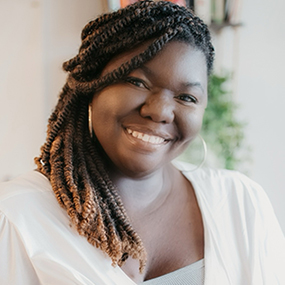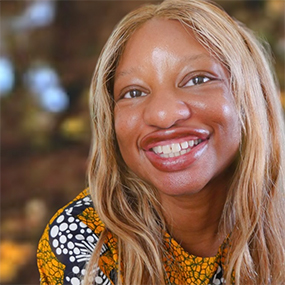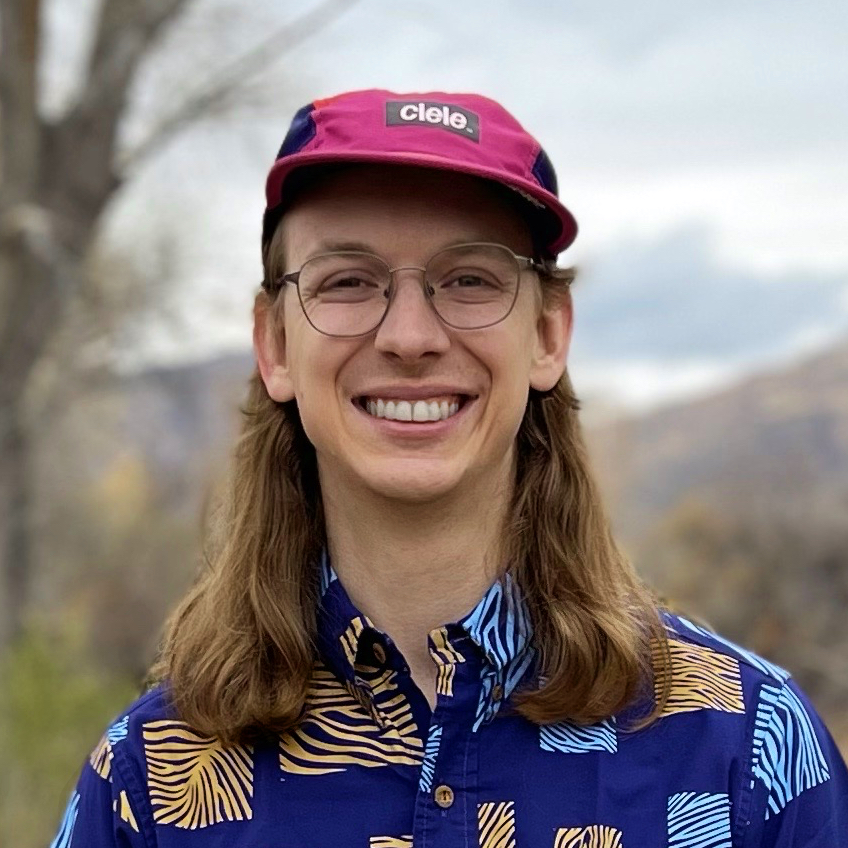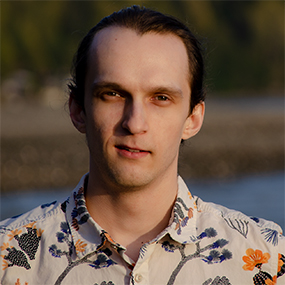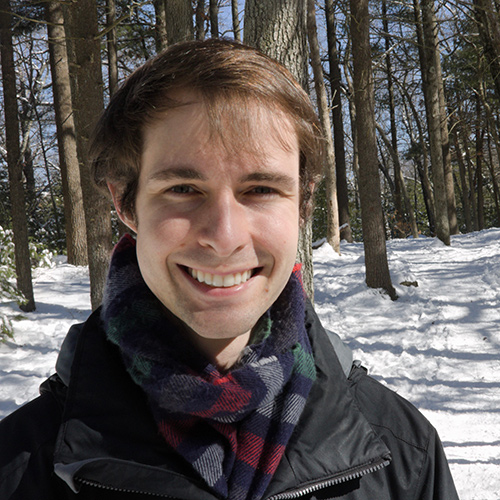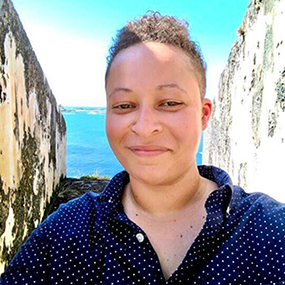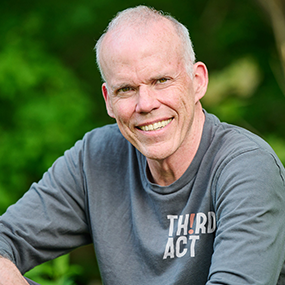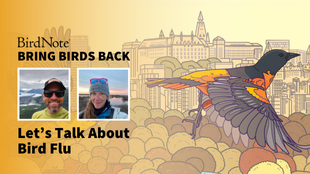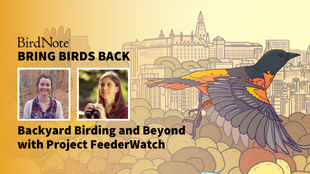

Join BirdNote tomorrow, November 30th!
Illustrator David Sibley and actor H. Jon Benjamin will face off in the bird illustration battle of the century during BirdNote's Year-end Celebration and Auction!
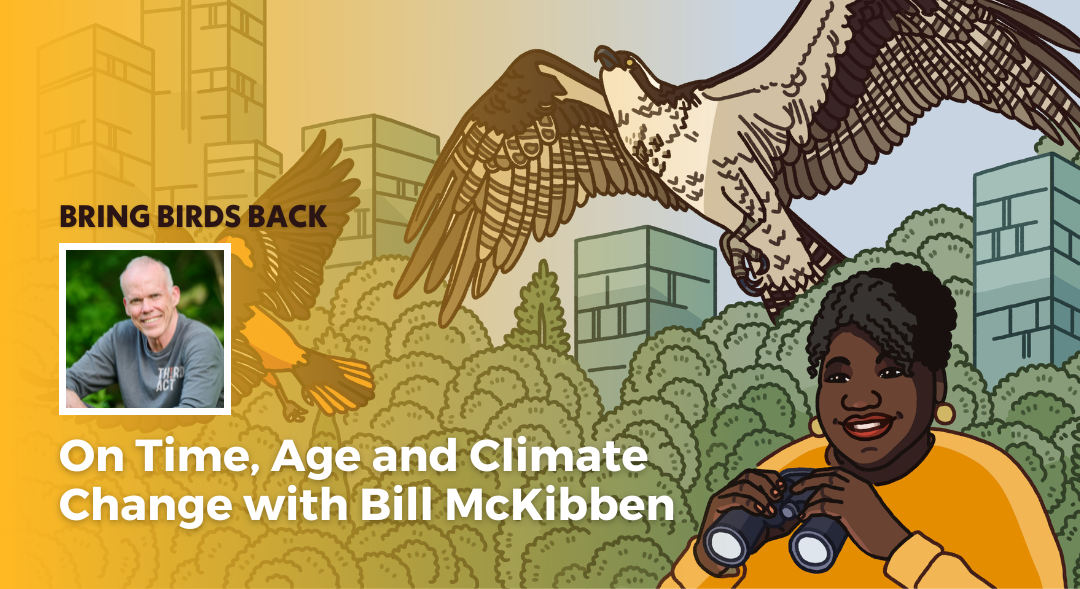
This season has been all about the mutual impact birds, humans and nature have on each other. To close it out, Bill McKibben joins us for an honest chat about the future of this dynamic, which inevitably includes the planet Earth. His book debut, “The End of Nature,” first sounded the alarm about climate change nearly 35 years ago. Now, Bill sits down with Tenijah to discuss climate change’s impact on all webs in our ecosystem if we continue on our current trajectory. Additionally, he talks about his organization, Third Act, that encourages fellow Baby Boomers to be leaders and allies to younger generations, as well as the most vocal in the fight for change — all while knowing they may not be around to see the full extent of its destruction. You don’t want to miss this one — press play!
More info and transcript at BirdNote.org
Want more Bring Birds Back? Follow us on Instagram! For more BirdNote, subscribe to our weekly newsletter. For ad-free listening and other perks, sign up for BirdNote+ here.
BirdNote is a nonprofit. Your tax-deductible gift makes these shows possible.
Bring Birds Back Season 4 is sponsored by the Cornell Lab of Ornithology.
[BirdNote Presents sonic logo]
Tenijah Hamilton: From BirdNote, this is Bring Birds Back. I’m Tenijah Hamilton.
[Coffee shop ambience fades in]
[Coffee shop Guitar Music Starts]
Hi, friend! The time has come that we meet again, in our imaginary coffee shop where we were, oh, say about seven or so episodes ago…
And this time, I just want to hear from you. This season has been quite the ride. I’m curious to know how it all landed? Were any of your points of view totally flipped or obliterated? Did you learn anything in particular you had never heard before?
Like, how green prison programs are changing futures and challenging correctional institutions. Or, I know I keep telling friends about how environmental and racial discrimination impacts not only low-income neighborhoods, but also the nesting and migration of birds. And how A.I. can literally help save birds from wind turbines.
Maybe your favorite stories this season were about the generational importance of passing down knowledge like a baton. Well, now, it’s in our hands. We’re far from the finish line — but we’re starting to see the path clearer with every lap.
[Coffee shop ambience fades out]
With this in mind, I’m so excited to introduce our final guest of the season. A man who requires very little introduction in the environmental world. The author of three best-seller books, a leading activist of 30+ years and now the poster child for elders teaming up with youth from around the world to fight climate change.
Here is Bill McKibben.
Tenijah Hamilton: Bill, how are you today?
Bill McKibben: I'm terrific. It's very good to be with you. It's a beautiful, beautiful day in Vermont, here in the woods where I've been. I've been out collecting sap from the maple trees and then cross-country skiing through the woods. And, there was a Barred Owl hanging around and, lots of chickadees at the feeder this morning and things. So life is good here in the woods, in the Green Mountain National Forest.
Tenijah Hamilton: Wow. As you're talking about all that, all I see is, um, a Bob Ross painting. Is that what it feels like?
Bill McKibben: Yeah, it's — a little bit. Can't be any place more beautiful in the world right now.
Tenijah Hamilton: No one has ever, you know, did a hard sell for me on Vermont, but I feel like I need to go now.
Bill McKibben: It's gotta be on your list to get to once or twice.
Tenijah Hamilton: Got it. I would love for you to introduce yourself to our audience. Tell us about you, Bill, and all the work you've done over the past 20, 30 years.
Bill McKibben: Sure. I'm a writer first and foremost. When I was a young person in my twenties and working at The New Yorker magazine, I wrote a book called The End of Nature. That was the first book for a general audience about climate change, what we then called the Greenhouse Effect. This would've been 1989. That book got translated into 20 or 25 languages and sort of determined much of the rest of my life. I've spent what is it now, almost 35 years since then, writing more about climate change, but at a certain point also figuring out that we were gonna have to do more than write. That we were gonna have to organize, as well.
And so, I founded a group called 350.org. It became the first big global grassroots climate campaign. We helped with the fight on the Keystone Pipeline and organized this massive fossil fuel divestment campaign that's become the largest, sort of, anti-corporate campaign ever, in some ways. We're at about $40 trillion in endowments and portfolios that have divested from fossil fuel. And now that I'm an older person, we've started a new group called Third Act, which takes people like me over the age of 60 and organizes them for progressive action, to protect our climate and to protect our democracy, which we think are very linked.
So that's sort of my work and as important, at least for me, is that I've spent almost all my life in rural America. First, in the red state area of upstate New York, the Adirondacks, which is the great wilderness of the American East. A place of extraordinary wonder, a massive state park, bigger than Glacier, Grand Canyon, Yellowstone, and Yosemite combined. And then for the last 20 years on the other side of Lake Champlain in the blue state of Vermont, but always living on dirt roads. And now I share a fence line with the Green Mountain National Forest, federal land here in Vermont.
Tenijah Hamilton: Wow, you can just tell that you are a tried and true nature lover, and it seems like a lot of the work you do kind of flows from that. And I will say, selfishly, as somebody who also self-identifies foremost as a writer, I love that that's how you start. And to me, I'm already seeing parallels in the power of storytelling, the power of evangelizing, and how that helps in the climate change movement.
But before we get into kind of the nitty gritty, more about your book and things like that: first thing’s first, is the Bill McKibben a birder?
Bill McKibben: I have dear friends and neighbors who are truly serious birders, the kind who hear a call in the distance and know just what it is. I'm not like that at all and I do not have a list of all the birds I've ever seen or anything like that. That said, I love birds as a part of the landscape and spend a lot of time looking at them wanting — you know, talking back and forth with the owls at night when I'm out for a walk, on and on and on.
So, I'm no, uh, Kingbird Highway kind of serious birder in any way, but I have a great deal of affection for the people who are, and great gratitude, especially for people who manage to hook up their hobby of birding with conservation, and understand that we really face a tremendous chance that an awful lot of that's gonna fall silent.
Tenijah Hamilton: And what I will also say is that even if you don't self-identify as a real tried-and-true birder, not only is this the perfect show for you to be on, but, it's also — I'm like, yeah, like me, me too. Like, I spend so much time talking to people who just emphatically love it, and I get a lot of joy from that. But I appreciate birds as just a part of nature, and these, these animals and creatures that we should protect.
Bill McKibben: I know that for me, I appreciate — above all — landscape. The things that get me emotional, almost, are the look of and the topography of a place. I love it in the fall up here when the leaves come down off the trees, 'cause then you can see the shape of the ridges again and things.
Tenijah Hamilton: So, if we can bring it back to your book, The End of Nature, I'm interested in what caused you to write that book. What made you feel like this has to be written and written now?
[Gentle, grunge guitar music begins]
Bill McKibben: This was 1989.
Tenijah Hamilton: Mm-hmm.
Bill McKibben: So, I had just been reading the early science on climate change. It was just beginning to come out. You know, I could fit every scientific report about climate change on the top of my desk. Now, you'd fill an airplane hangar with this stuff, but I knew that it was going to be the biggest story that there ever was. And I also knew that I was having a very emotional reaction to it. At the time, that emotion wasn't so much fear, though there was some of that, because things hadn't happened yet. It was just at the very beginning of happening. And so, we weren't yet seeing the massive floods and heat waves and things that we're seeing now.
But you could tell it was coming. But I think the kind of dominant emotion in that book was a kind of sadness. And it was rooted in the idea that these wild places, which I loved so much, particularly the Adirondacks where I was living, weren't going to be wild in the same way anymore.
I remember a quote of Henry David Thoreau's. He said he could walk a half hour from his house and come to a place where no man lives from one year to another. “And there consequently politics are not, for politics are but the cigar smoke of a man,” which is a great image. And I was living in a place where I could walk five minutes and come to a place where it's possible no one had ever lived. 'Cause I — we were really living in the wilderness. And yet, if we're changing its temperature, and hence the flora and the fauna and all of that, in some other sense, it's not wild in quite the same way anymore. And that made me really sad.
That's where that title, The End of Nature, came from. The idea that we were ending nature as a kind of totally independent force larger than us. That we were getting so big that we were overwhelming the world around us. Now, there's lots of more pressing reasons now to work on climate change. ‘Cause there's now millions of people dying and millions of people having to leave their homes. And so most of the work I do now probably centers on those things. But at some level it's also rooted still for me in this sadness about, just the idea that we're overwhelming everything around us.
Tenijah Hamilton: Has your view shifted in the past 30 years as far as that sadness? Is it still there? Do you find reasons to be more optimistic about the future of climate change? I guess I'm wondering, yeah, like how you feel we've progressed since then.
Bill McKibben: I mean, I'll give the bad news first. We basically haven't reacted well at all. We knew pretty much everything in 1989 that we needed to know, and yet we didn't really do anything with it. We've put more carbon in the atmosphere since 1989 than in all of human history before then. We kept building bigger cars and —
Tenijah Hamilton: We kind of doubled down.
Bill McKibben: Yeah, exactly right. So, that’s been very depressing. I've been to jail now half a dozen times or something, and that's crazy. No one should have to go to jail to get our leaders to take a note of physics, but in a world dominated by the power of the fossil fuel industry and things, that's what we've had to do.
[Music fades out]
So the good news is — and it is good news — is that we're now finally, 30-some years later, at a point where I think it's possible that we can pivot, and perhaps even quickly if we really put our minds to it.
In the last decade, we've built this large movement around the world with great figures like Greta Thunberg, and millions more young people, especially. And in that same decade, the engineers have dropped the price of renewable energy, solar power and wind power, so dramatically that it's now the cheapest way to produce power on this Earth. So those two things taken together give us some hope that we might make change. Eventually we'll make change. In 50 years from now, we're gonna run this planet on sun and wind because it's essentially free. But if it takes us anything like 50 years to get there, then the planet we run on sun and wind will be a broken planet. So our job is to speed this up.
Climate change is a timed test. It's not like other political issues that we're used to dealing with. As long as I've been alive, Tenijah, we've been fighting over, say, healthcare. I assume that someday, America will join all the other countries in the world and give healthcare to its people. And I think that'll be a good day. But when we finally get around to it, the fact that we wasted all these decades won't make it harder to do it in the end.
Climate change isn't like that. Once you melt the Arctic, it's not like someone's got a good plan for how you freeze it back up again. You go past these series of cliffs that you can't climb back up. So that's what scares me. Uh, the Intergovernmental Panel on Climate Change, our best climate scientists, have told us we need to cut emissions in half by 2030 to have a hope of meeting those targets we set in Paris seven years ago. And by my watch, 2030 is now six years and what, nine months away? Man, we got our work cut out for us.
Tenijah Hamilton: That definitely brings me back to one of the reasons that we started this show: the startling statistic that said we've essentially lost 3 billion birds in a span of a generation. That is just really unfathomable and a number that big, as far as losing birds, is hard to swallow. And so —
Bill McKibben: That's a good pun, by the way. Just, just noting in passing.
Tenijah Hamilton: Hard to swallow?
Bill McKibben: Yes. There you go.
Tenijah Hamilton: Bah-dum tsss.
[Bah-dum tsss]
[Barn Swallow calls]
Um, you once said that “Birds matter not least because amazing migrations remind us what an interconnected web we live in, from pole to pole.” So, I would love to hear you kind of expound on that, and just the threat that we see to birds today and what it tells us about our world.
Bill McKibben: Absolutely. I think one of the hardest things for human beings to do is to remember that we live on a planet, like Mars or Venus, you know, big chunk of rock floating through space. It's hard for us to remember that because, you know, we're comfortable in our own very small piece of that planet. But we have to be reminded about the fact that we live on a planet so that we respect the boundaries of it.
I mean, birds, especially the big charismatic migrations of birds, they don't forget that we live on a planet. They're an annual reminder of how tied together everything is. The fact that there are birds that manage to essentially make the journey from the Antarctic to the Arctic is just insane.
I remember being down in the Antarctic and watching the albatross, realizing that these are birds that, for some years, may never even land on land. You know, they're just circling the globe. These are awesome reminders of what a charmed planet we get to live on.
And because everybody likes birds, they seem particularly capable of helping us realize this a little. And the fact that they're so vulnerable. If you're a big migratory species, well, we can manage to screw that up all kinds of different places. You know, you cut down the rainforest where they're spending the winter, or you pour pesticides on the field where they're spending the summer. Pretty soon, you know, you have a drought so that the prairie potholes where they were planning to land aren't there anymore, you know, with any water in them, on and on and on.
I mean, it’s sadly not surprising that there are 3 billion fewer birds. I mean, we think that about 70% of wild animal populations have disappeared since 1970. I was alive in 1970. The fact that the world's become that much more lonely that fast, is really spooky. And it should scare us.
Tenijah Hamilton: What a perspective. The fact that the world has become that much more lonely. Oof. I don't know if I've ever heard it framed like that before and it's, like, immediately, I felt this sense of, I don't even know, foreboding, almost? The world is getting lonelier, the more these species cease to exist.
Bill McKibben: Yeah, that's what it feels like to me. Like we were born onto this planet with this huge suite of plants and animals: the late Pleistocene. And it seems to me that these are some of the brothers and sisters that we were born onto this Earth with. And trying to hold onto a little bit of that late Pleistocene abundance is a worthwhile way to spend one's life.
Now, of course, we also understand that it's people that are deeply at risk from precisely the same forces. We know that phrase, ‘canaries in the coal mine.’ In this case it's kind of literal because coal mining is one of the things that's gotten us in the trouble that we're in. But as birds have gone, so now people.
Our habitat is shrinking and shrinking dramatically. Sea levels rising, and making coasts harder to live on. Drought is spreading, making continental interiors less habitable.
Think about Somalia or Pakistan, all the poorest places on Earth, which do not have the money to deal with drought or flood the way that California does. And then remind yourself that places like Somalia or Pakistan, nobody there did a damn thing to cause climate change. Somalia is now in its fifth straight rainy season with almost no rain. The Indian Ocean's gotten warmer and it's changed weather patterns. Well, the average Somali emits about 1/500th as much carbon in the course of a year as the average American. Not their fault — our fault — and that's one of the reasons we gotta do something about this.
Tenijah Hamilton: Whew. Hearing it summarized in this way— and really, you're kind of taking a global view of the issue, which I think is super necessary — it seems so big, and it is big, and I know that's a part of the message you've been trying to get out into the world for more than 30 years.
[Music starts]
Tenijah Hamilton: When we come back from the break, Bill shares more about what led him to create Third Act, how it’s been instrumental in bridging the gap between generations and what we all can do to save our planet — starting today.
Stick around.
[Music fades out]
[MIDROLL]
Tenijah Hamilton: You mentioned a little bit about another one of your books and I wanted to quickly chat about The Flag, The Cross, and the Station Wagon: A Graying American Looks Back at His Suburban Boyhood and Wonders What the Hell Happened. Which um, talk about a title! It seems to hint at some things that we talk about a lot on this show, which is really — generational conversations, generational divides, thinking about, like, what we can learn from each other and what we can learn from ourselves. And so a part of what I wanna know is: what does young Bill have to teach older Bill and vice versa about — *gestures wildly to everything.*
Bill McKibben: Well yeah, Tenijah, this is a question that I've been thinking about a lot recently. One of the reasons I wrote that book was because I was doing the thinking that led to the establishment of this group called Third Act for older people.
When I was in my first act, this was at the apex of the Civil Rights Movement, it was the first Earth Day in 1970, with 20 million Americans in the street demanding that we clean up the air and the water.
And so when we look around the world now and see the poles melting, the coral reefs disappearing, on and on and on, and when we look at our country and see attempts at racialized voter suppression, when we see Americans storming the U.S. Capitol and killing policemen in order to stop the counting of votes — when we see that kind of stuff, we do look around and just think, what on Earth? How did this ever come to be? This was not the world that we thought we were going to grow up in.
The good news is that older people are beginning to rise to the defense of this world, and that's really important. You know, one of the reasons that we started Third Act was because I had heard a few too many people say to me, ‘Oh, climate change is up to the next generation to solve.’ It's true that young people are doing a fantastic job, people like Greta is one of my old friends in the world. I adore her. I love working with her.
And there are 10,000 Greta Thunbergs around this planet. Young people who are unbelievable leaders. So they're doing fantastic work. But for all their energy and idealism and intelligence, young people lack the structural power to, by themselves, make the changes that we need to make. Older people have some of that structural power. There's 70 million of us over the age of 60 in the United States. Not only that, we punch above our weight politically because we all vote. There's no known way to stop old people from voting. And we ended up with most of the resources. About 70% of the country's financial resources belong to the baby boomers or the Silent Generation above 'em, compared with about 5% for millennials.
So if you wanted to take on Washington or you wanted to take on Wall Street, and I'd kind of like to do both, it helps to have some people with hairlines like mine engaged in this fight. And the best part of it is that we are figuring out all kinds of ways to really actively partner with young people in this work. And it's fun for people on both sides. It's obviously fun for old people to be working with people the age of our grandkids. Among other things, it turns out that it's actually easier to work with people who are your grandparents' age as opposed to your parents' age. It's a less fraught relationship. So I'll give you an example.
[Driving, pizzicato string music begins]
Right now we're taking on these banks, the big American banks, that are the biggest funders of the fossil fuel industry. We've got to get them to stop. And so we've been doing all these protests. I was at a protest in New York not long ago, in fact in your old stomping grounds of Brooklyn.
Tenijah Hamilton: Mhm.
Bill McKibben: We started at Grand Army Plaza, and of course, the high school kids who were there were at the front of the march, ‘cause they're somewhat sprier than the rest of us. But at the back, there was a big group of us from Third Act with a big banner that said, ‘Fossils Against Fossil Fuels,’ so, you know—
Tenijah Hamilton: I see what you did there.
Bill McKibben: Done in the right spirit, it's fun to do all this work together, you know? And I think it helps young people get a little past the kind of ‘Okay boomer,’ kind of thing, you know? Like, yeah — I get why you're saying that. And so you'd probably be happy to know that there's some people who are trying to do what they can.
And if you think about it, climate change is the perfect place to be doing this kind of intergenerational work, because the decisions we make now are gonna determine what the world is like for many, many, many, many generations to come.
[Music fades out]
We're not just wiping out the plants and animals and people of today, we're foreclosing possibilities for the next hundred or 200 or 300 generations to come after us. So that sense of generational work is really, really strong.
Tenijah Hamilton: That sounds really innovative, and I love your take on how to kind of merge activism between generations. And I know you've mentioned a couple of names, one being Greta Thunberg.
For me, um, I think of Mari Copeny, who is also known as Little Miss Flint. And she lives in Flint, Michigan, and just raised a lot of awareness for the water quality and things of that nature. And I remember just being so inspired by the audacity for this next generation to ask and honestly demand more. So I'm curious to hear some of the younger folks who you're inspired by.
Bill McKibben: There's endless. And one of the funny things, this isn't entirely true, but one thing that is pretty true is an awful lot of them are young women. My friend, Xiye Bastida, Indigenous activist — remarkable. Uh, Alexandria Villaseñor. When I was over in the last climate talks, I got to see my friend Vanessa Nakate, who's sometimes called the Greta of Africa. She's from Uganda, an activist I admire incredibly. Varshini Prakash from the Sunrise Movement and Evan Weber, her colleague. Haven Coleman from Colorado.
I mean, I could list young leaders all day and all night. Lots and lots of very, very young people. And I got to know zillions of them because we started this fossil fuel divestment campaign, and a lot of that work happened on college campuses around the country. I mean, these are terrific activists. And when they get outta school, they want to keep going.
I mean, if you're 25, this is like self-defense. If we don't get the climate crisis under control, your whole life's gonna be warped by it. Look, I'm gonna be dead before the worst of this stuff kicks in. So for people my age, it's less about self-defense and more about — more about your legacy, about what you leave behind, which sounds like an abstract concept. But really your legacy is the world you leave behind for the people you love the most.
And we do not want to be the first generation to leave behind a world that's worse than the one we found. But that's what we're doing. I mean, if there's 3 billion fewer birds on it than when we were born, that's not good. You know, that's a failure. That’s why we're doing what we can to try and correct it.
Tenijah Hamilton: What would you say to the young person who has an interest in advocating for climate change and protecting our environment and really changing the discourse around climate change for Gen Z and beyond? What would you say to that young person?
Bill McKibben: Job one is to find other people to do it with. America is a very individualistic culture and that has its benefits. And there are things that you can do as an individual to help with climate crisis. You know, put solar panels on your roof and ride an e-bike. But the most important thing an individual can do is be a little less of an individual and join together with others in movements large enough to make basic political and economic shifts, which is what we need now if we're gonna get this done.
Tenijah Hamilton: What do you think is stopping, you know, all of us, from having this sustainable movement with a government and society that really upholds these values? What do you think is the thing that stops us?
Bill McKibben: I think the biggest thing that stops us is the ability of those in power at the moment to use the tools that they have to block change. A very small number of very rich people end up making most of the decisions. I mean, I've watched, up close the fossil fuel industry, big oil, for 30 years now, deploy this massive campaign of disinformation and denial and things. And they have so much money that it's pretty effective. I mean, look, you know, until last year when this Inflation Reduction Act climate bill finally passed by Kamala Harris casting the tie vote in the Senate, until that happened, the US Congress had done nothing about climate change for 34 years. That's painful. And it's because of that power.
Tenijah Hamilton: It's really interesting how we talk about climate change and we talk about nature, and we kind of inherently slide into a conversation about policy and politics and politicians and things like that. And interestingly, I think about the Thoreau quote that you mentioned earlier, saying that, essentially, that nature is kind of divested from politics. But I guess it's always been my view that it is inherently political.
Bill McKibben: Now it is. There's no question. One way to think about it is, in the 20th century, human beings suddenly got very, very big. For most of human history, we've been relatively small compared to the forces of nature around us, you know? First, we learned how to blow up atomic weapons which carried their own possible end to nature.
And then we learned that we were burning fossil fuel at such a level that it was overwhelming the world around us. We're the biggest thing going now. And so we've gotta figure out how to step back, reign ourselves in a little bit, and especially those of us who are affluent Westerners who are producing most of the problem.
Tenijah Hamilton: I wanna think and talk and get your thoughts on the ways that climate change intersects with race. And I think about somebody who, I believe you know, Heather McGhee, and her book, The Sum of Us. And in The Sum of Us, she talks about the ways that racism has negatively impacted everyone, not just people of color, including its impacts on, like we were just mentioning, politics and climate change. She refers to it as drained pool politics, where she compares it to the ways in which white citizens in the 1950s and the 1960s would often decide to drain public pools rather than integrate it. And in this way, instead of choosing to save the planet and therefore improve a way of life for everyone, much of what we're seeing is the decision to instead allow the world to essentially collapse on itself instead. Very curious what you think about that.
Bill McKibben: I think Heather's one of the smartest people I know, and that's an important book. And the organizing and work that she does is very important. And it's a great metaphor, you know, because yeah, like there's towns that would rather have no swimming pool than one where everybody got to go swimming.
We live on a planet where at some level we're sharing everything, especially the air around us. There is no way to keep carbon from crossing borders. And it's true that we're making life hardest for the poorest and most vulnerable, but we're now at the point where we're making life hard for everybody, even rich people.
My last book talked a lot about both American racial history and world environmental history, and they're alike in a lot of ways. We have debts that are owed. Some of those debts are the reparations for the racial history of this country. And some of those debts are reparations for raising the temperature for everybody on this Earth.
And we have the money to pay those debts, we just don't want to pay 'em. That’s why when we work at Third Act, we work on democracy and on climate change, 'cause they're very linked.
Tenijah Hamilton: Absolutely. I think that makes a lot of sense, and it feels like we're talking about the eco-socio impact of race, right? How does it permeate all of these aspects in our life, especially as it comes to climate change? We already talked about vulnerable communities that you mentioned in Somalia and Pakistan, but I know right here in Atlanta where I live, areas that are more likely to have people of color or low-income folks are degrees hotter.
Bill McKibben: And this is not by accident. You can go back to the 1930s and find the maps that the federal government used to redline America to say what neighborhoods were gonna get invested in, what weren't. And then the banks then followed in their racialized lending policies. And the neighborhoods, minority neighborhoods that were rated D are five to 10 degrees hotter than the leafy green areas that they rated A.
And that — on a larger sense in the world as a whole, that’s — exactly the same thing is going on. And then you can start thinking about it in terms of individual human beings, because the people who live in those neighborhoods are way more likely to get asthma, because they're breathing bad quality air from fossil fuel combustion. We now understand people who live in those neighborhoods are much more likely to get things like kidney stones because it's hotter and they get dehydrated.
That legacy plays out in this country and it plays out around the world. These are the aftereffects, ongoing effects of colonialism and so on.
We have to come out of our comfort zone because the planet is way outside its comfort zone. That's what it means when 3 billion birds have died. So that's why I'm really glad that there are lots and lots of people who are willing to march and sign letters and go to jail and do what it takes in order to make that kind of change.
Tenijah Hamilton: One of my favorite Gen Z nature enthusiasts/activists is somebody we recently actually had on the show. His name is Isaiah Scott. He is a young Black birder. He's actually studying at Cornell right now.
And we were chatting. He was like, ‘yeah, and you know, I'm reading Bill McKibben's book in class right now.’ And I was like, great. Um, and so I asked Isaiah, I was like, well, do you have a question for Bill that we can get answered?
Isaiah Scott: One thing that I noticed in the book was his views about how nature is separate from humans. So, I guess one question is, does he see a future where humans can be stewards and connected to nature in order to save nature?
Bill McKibben: That is the great hope that 50 years from now we will have evolved to the point where we understand our role as humans to include and maybe be centered on protecting the incredibly beautiful world that we were born into, and not understanding the world as just a place where we try to get ahead, each one of us, our own self, but where we look out for each other and we look out for the rest of creation. And I don't know whether that's possible.
[Wondrous, contemplative music begins]
I remember taking a bunch of kids camping once, and these were kids who hadn't camped before. And where I live, we have extremely dark skies. So, I was showing them the Milky Way and they'd never seen the Milky Way before. And you know, their reactions were correct. I remember one guy saying, ‘whoa, freak me out, dude!’ And I remember thinking, like, yeah, that's probably the moment at which humans became humans, was when some ape looked up at the sky and said, you know, ‘Freak me out dude,’ had some sense of the vast scale of this thing.
One of the best things about the natural world is that it reminds us that we're a small part of something very big. Our culture constantly tries to make us think we're the most important thing around. That's what advertising's about.
And nature's kind of the opposite of that. And the funny thing is, we're much happier when we're out in that world. Our blood pressure drops, all the ways that we can measure things change. So let's hope that we can get back to understanding the world that way, and let's hope that there's some world left to get back to by the time we do it. That's why we fight so hard.
Tenijah Hamilton: That feels like the perfect encapsulation and the perfect way to kind of cap off this conversation.
Bill McKibben: Absolutely. Tenijah, I just want to say so much thanks for your work and what a pleasure to get to talk to you. Thank you for doing all that you do, and I really look forward to seeing you in person at some point.
Tenijah Hamilton: Yeah, well, I think I have to come to Vermont now.
Bill McKibben: Yeah, yeah, yeah.
[Music in the clear]
Tenijah Hamilton: That’s all for season four of Bring Birds Back! Thank you for tuning in.
For more on Bill McKibben’s Third Act and other resources from the episode, visit BirdNote.org.
And don’t forget to connect with us — your favorite friendly bird lovers — on Instagram @BringBirdsBack. We’d love to hear from you about your favorite episode or moments this season. Follow us for show updates, exclusive behind-the-scenes content and more!
[Music ends]
[Conclusive music starts]
Bring Birds Back is produced by Mark Bramhill, Sam Johnson and me, Tenijah Hamilton. Our fact-checker is Conor Gearin. Our Managing Editor is Jazzi Johnson and our Content Director is Jonese Franklin.
Music is by Cosmo Sheldrake, Mark Bramhill, and Blue Dot Sessions.
And I want to give a special thanks to these folks for making Bring Birds Back possible: Nick Bayard, Bibi Baksh-Pabion, Jason McCue, Katie Meyer, Jessica Rugh Frantz, Zahiyah Frazier, John Kessler, and Viki Merrick.
[Music ends]
Tenijah Hamilton: So we talked about how you wouldn't classify yourself as a birder, but do you have a favorite bird?
Bill McKibben: Ooh. There's too many to choose from, but I've spent some time in the Antarctic. So that, maybe that might be my favorite. I like those Chinstrap Penguins.
I don't know if you've been down there, Tenijah. For the first thing, you can smell the penguin rookeries, you know, like 15 miles away. Both penguin parents take turns going out and catching fish that they come back and regurgitate for their young. And the young penguins, if they don't get enough food, they immediately start chasing their parents around and squawking at 'em.
So you're at this rookery and there's just, there's thousands of these penguins running after their poor parents screaming at them, over and over again. Which, you know, I was like, wow, there's a lot of metaphors here. I'm a parent myself. So like, I was like, okay, I recognize some of this.
But it was so amazing and so beautiful. That whole Antarctic is one of those places where it's a little like going to a different planet and a planet where humans aren't in control yet. And so you have a sense, I think, of what the world ooked like once upon a time.
Tenijah Hamilton: I haven't been to Antarctica, but I, um, spent a year in New Zealand and I remember feeling a similar sense of like, I have never experienced the natural world in this way. And the birds are truly one of a kind.
Bill McKibben: Well, I saw — when I was in New Zealand, I saw these penguins that lived in the forest. You'd watch 'em come out of the surf and waddle across the beach, and then they nested in the woods. And they blew my mind too.
About guest Bill McKibben
Bill McKibben is a contributing writer to The New Yorker, and a founder of Third Act, which organizes people over the age of 60 to work on climate and racial justice. He founded the first global grassroots climate campaign, 350.org, and serves as the Schumann Distinguished Professor in Residence at Middlebury College in Vermont. In 2014 he was awarded the Right Livelihood Prize, sometimes called the ‘alternative Nobel,’ in the Swedish Parliament. He's also won the Gandhi Peace Award, and honorary degrees from 19 colleges and universities. He has written over a dozen books about the environment, including his first, The End of Nature, published in 1989, and his latest book is The Flag, the Cross, and the Station Wagon: A Graying American Looks Back at his Suburban Boyhood and Wonders What the Hell Happened.

